
Topics
Guests
- Simón Mejíathe founder and a member of the Colombian Grammy Award-winning band Bomba Estéreo.
Links
President Gustavo Petro’s inauguration Sunday ushers in a new political era for Colombia, with Francia Márquez Mina becoming the first Afro-Colombian woman to be sworn in as vice president. We feature part of Petro’s historic inauguration speech and play part of a recent interview with Simón Mejía, a founding member of the Grammy Award-winning Colombian band Bomba Estéreo, who says the new leftist presidency “brings hope … to the underrepresented people of the periphery of Colombia.” He also speaks about his time working on a new film project called “El Duende” that centers Afro-Colombians, who have long faced violence and repression.
Transcript
AMY GOODMAN: “Mamita” by Bomba Estéreo and Simón Mejía, who we’ll be hearing from in this next segment. “Mamita” just released. This is Democracy Now!, democracynow.org, The War and Peace Report. I’m Amy Goodman.
In Colombia Sunday, thousands celebrated the historic inauguration of President Gustavo Petro and Vice President Francia Márquez Mina, ushering in a new and hopeful political era in the South American nation after centuries of right-wing rule. Petro is the first leftist president to ever govern Colombia, while Francia Márquez is making history as the first Afro-Colombian woman elected as vice president. The pair won Colombia’s presidential runoff election in June with over half the vote.
Petro is a former member of the guerrilla group M-19, former senator and mayor of Bogotá, who has vowed to fight inequality and poverty in Colombia, increase taxes on the wealthy, expand social programs, restore peace, and combat the climate crisis by halting new oil extraction and moving away from an economy long dependent on fossil fuel. He has also pledged free public university education, healthcare reform and reestablishing relations with neighboring Venezuela.
Gustavo Petro addressed supporters in Bogotá Sunday during his inauguration, where he also denounced the brutal, U.S.-backed so-called war on drugs.
PRESIDENT GUSTAVO PETRO: [translated] I will finally unite Colombia. We will unite, between all of us, our beloved Colombia. We have to end the divisions that confront us as a people. I do not want two countries, just as I do not want two societies. I want a strong, just and united Colombia. The challenges we face as a nation demand a period of unity and basic consensus. It is our responsibility. …
We call on all those who are armed to leave their arms in the haze of the past, to accept legal benefits in exchange for peace, in exchange for the definitive nonrepetition of violence, and to work as owners of a prosperous but legal economy that puts an end to the backwardness of the regions. …
It is time for a new international convention that accepts that the war on drugs has completely failed, that it has killed a million Latin Americans, many of them Colombians, during the last 40 years, and that it leaves 70,000 North Americans dead by overdose each year from drugs that are not produced in Latin America. The war on drugs strengthened mafias and weakened states.
AMY GOODMAN: That was Colombian President Gustavo Petro addressing Colombia during his inauguration in Bogotá yesterday. The day before, on Saturday, Indigenous leaders from throughout Colombia held a symbolic inauguration for Petro and Vice President Francia Márquez Mina in Bogotá.
Márquez is a prominent land and water defender, winner of the 2018 Goldman Environmental Prize, who helped organize the women of the community of La Toma in Colombia’s Pacific southwest region of Cauca to stop illegal gold mining on their ancestral land. Despite threats from multinational corporations and paramilitaries, she continued to fight back in defense of the Earth. Márquez Mina is also a lawyer and a former housekeeper.
This is Francia Márquez speaking at the Indigenous-led ceremony Saturday.
VICE PRESIDENT FRANCIA MÁRQUEZ MINA: [translated] Brothers and sisters, here I am with you, ready to hold your hands, to walk alongside this government tenure, which will not be easy, because, we must say, here in Colombia we have the most dangerous elite in the region.
AMY GOODMAN: Francia Márquez Mina, the first Afro-Colombian woman to serve as vice president in Colombia’s history.
Well, just after their election, but before the inauguration this weekend, I spoke to Simón Mejía, founding member of the Grammy Award-winning Colombian band Bomba Estéreo, about a new project that centers the resistance, experiences and traditions of Afro-Colombians, people who have long faced violence and repression from right-wing governments and paramilitaries, drug traffickers and multinational corporations seeking to exploit sacred natural resources on the land. The project is called Bomba Estéreo Presents, El Duende, which means “The Elf,” or “The Goblin,” a musical journey on Colombia’s Pacific coast. We began our conversation speaking about the significance of the election of Gustavo Petro, a former guerrilla member, and Colombia’s — and Francia Márquez Mina, the Afro-Colombian woman and environmentalist, as Colombia’s vice president.
SIMÓN MEJÍA: Yeah, well, I think it’s historical. It’s historical for Colombia, because you know that Colombia has been, for — I will say, for centuries, right-oriented in terms of politics. And all the left candidates that we have in recent history that were candidates for presidency were killed. So, having this person that was from a very symbolic guerrilla here in Colombia that was called M-19, a left-orientated, choosing him as vice president Francia Márquez, that is a social and environmental leader, in a country where more environmental and social leaders are killed in the world, is really symbolic.
And it’s really — it brings hope, hope to the people, to the underrepresented people of the periphery of Colombia, who are the ones that voted for Gustavo Petro, the Afro communities, the Indigenous communities, the campesinos, the farmers, the poor people around the country that have been undertaken for years and years. So, it’s a good time for change. There is hope in the air. We don’t know what’s going to happen, but the good thing is that there is hope in the air. And I feel when there’s hope in the air, there’s light at the end of the tunnel. So, we’ll see what happens, and people are really excited about this.
And I think that regarding what’s happening to the — in the world, that you see that everything is turning to the right. Having Colombia and many other countries in Latin America turning to a center, to a left is very symbolic of how this Latin America piece of the Earth and Central America might be really important for the future of politics in the world, especially if we unite as one bloc, not just small countries, but one bloc, protecting our environment and asking for things from the First World countries.
AMY GOODMAN: Simón Mejía, I wanted to ask you about the film that you were featured in in 2020, Sonic Forest, which follows your journey across the Colombian Pacific coast, spending several weeks with Afro-Colombian and Indigenous communities, who have been on the frontlines of the violence and the killing, Colombia one of the most violent places, lethal places for environmentalists all over the planet. Can you talk about what you learned on that journey and what you want to convey to the world through your music and your research?
SIMÓN MEJÍA: Yes. That was a project that we made with an NGO, a North American NGO, environmental. It’s a purely environmental film. And we did it with an organization that is called Stand for Trees. They do these projects all around the world linking forest conservation with carbon credits. So, we were invited by them to do the piece of Colombia, that was meant — that is and happens in the Pacific rainforest in Colombia.
Pacific rainforest is a forest almost as important as the Amazon jungle for Colombia and for the world. It’s one of the most biodiverse jungles in the world. It’s full of water. It’s impressive, full of water. But at the same time, it’s one of the most conflicted places in Colombia, because there’s illegal and legal gold mining, and there are routes of drug trafficking. I have to say that the drug trafficking is the main problem here in Colombia — not drug trafficking, but I think cocaine being illegal is the engine to all the deaths that we have in Mexico and in Colombia. So, I will have to say also that anyone around the world who buys cocaine is carrying death here in Mexico and in Colombia. So, if they don’t legalize it, the problem will be forever, and we’ll have death and violence forever in the countries that are involved in this illegal business that should be legal.
So, this film, it wasn’t about drug trafficking. It was about projects, of communitary projects in the Pacific, Afro — one Afro and one Indigenous, that are protecting thousands and millions and millions of hectares of forest, in exchange of carbon credits. That’s how they finance — finance, do the work and do their work and protect the jungle. And the objective of the film was just to have a pair — a musician or an artist to go and show that to the world, know how these communities are protecting forests, that they are key to climate balance, key to climate change and key to absorbing all the carbon that is in the atmosphere.
So, we went there, and as I was a musician, we related it with music. So I was with the communities. We did, like, musical encounters. And in the middle of the musical encounter, we’d talk about the work they do for protecting this forest, the menaces that they have. And it was beautiful, because it was offering the Indigenous community — they live each by the side, but it was knowing the process behind all this huge and really important work that they do, facing real dangers, because protecting forests here in Colombia is a dangerous task. And being a social or environmental leader is really dangerous in Colombia, because they kill them. They kill them. So, visualizing this is a way to show to the world the important — the thing that they do and how important it is and how important it is to protect these people, as well.
AMY GOODMAN: Founding member of the Grammy Award-winning Colombian band Bomba Estéreo. We spoke to him in Bogotá. To see the full interview and hear his music, you can go to democracynow.org, in both English and Spanish.
Coming up, we go to CPAC. This is Democracy Now!, democracynow.org. Stay with us.

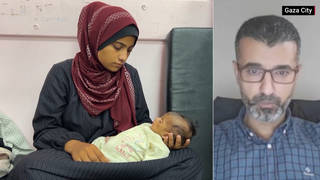
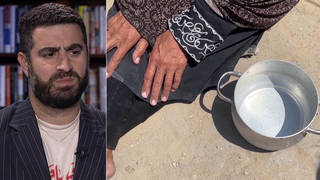

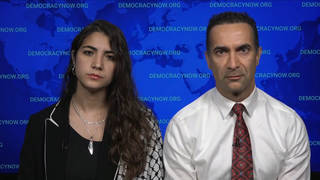





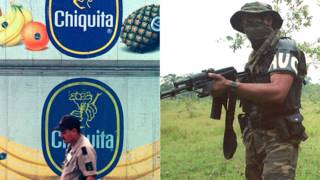

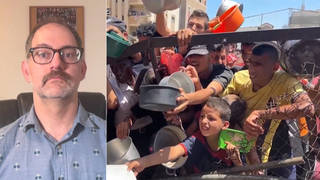
Media Options